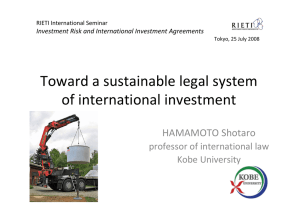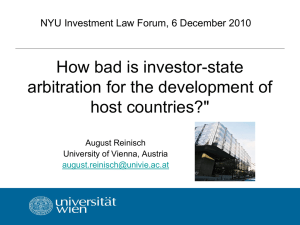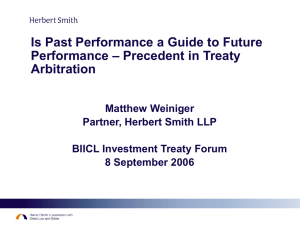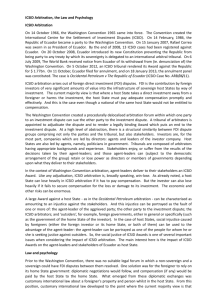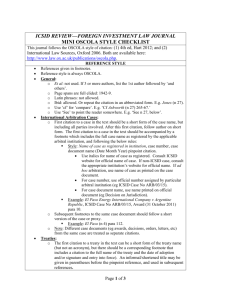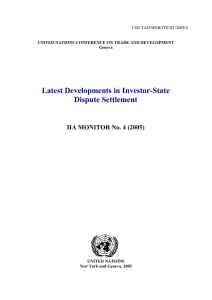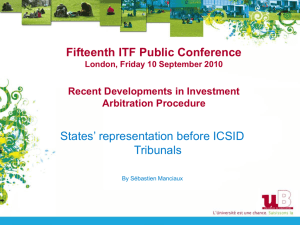Lecture 2. ISDS
advertisement
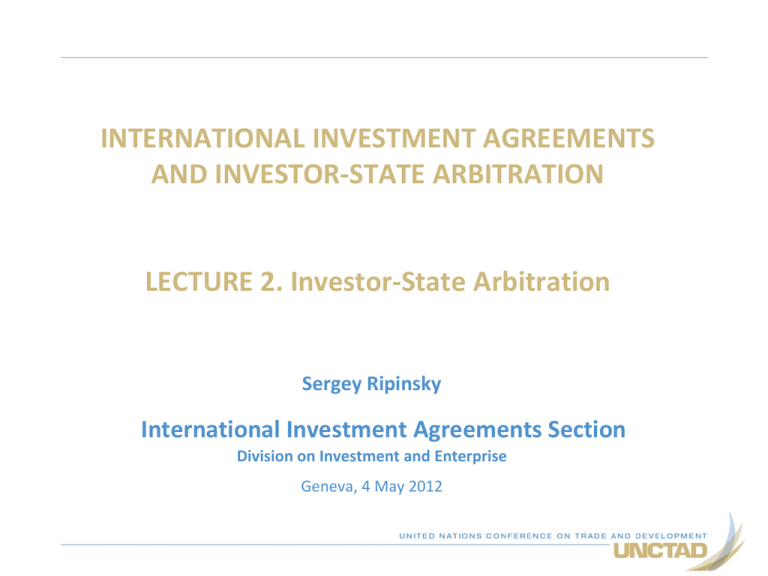
INTERNATIONAL INVESTMENT AGREEMENTS AND INVESTOR-STATE ARBITRATION LECTURE 2. Investor-State Arbitration Sergey Ripinsky International Investment Agreements Section Division on Investment and Enterprise Geneva, 4 May 2012 Historical context Previously, two options available to a foreign investor: 1) 2) Seek relief in the local courts or administrative tribunals of the host state. Request diplomatic protection by home government. Need for a neutral forum that would: – – – – – Allow direct claims by investors Be impartial and independent Consist of highly-qualified specialists Fast Cheap 1965 ICSID Convention • “A-national” forum to administer investment disputes • Part of the World Bank group • Can be engaged if both disputing parties consent to arbitration • Each disputing party appoints one arbitrator • Awards are enforceable in all ICSID Contracting States (147) ICSID and UNCITRAL – key differences • • • • • • Institutional v. ad hoc Nationality of arbitrators Arbitrator fees Confidentiality Review of awards Enforcement of awards Statistics of IIA-based disputes 2011 • 46 new known cases filed (34 of them in ICSID) • In 38 cases, respondents are developing or transition economies: e.g., Venezuela (10), Ecuador (4), Egypt (4), Peru (3) and Poland, Philippines and Turkmenistan (2 each) • 35 of the 46 new cases filed by investors from developed countries. 50 500 45 450 40 400 35 350 30 300 25 250 20 200 15 150 10 100 5 50 0 0 2011 2010 All cases cumulative 2009 2008 2007 2006 2005 2004 2003 2002 2001 Non-ICSID 2000 1999 1998 1997 1996 1995 1994 1993 1992 1991 1990 1989 1988 1987 ICSID Cumulative number of cases Annual number of cases Known investor-State disputes 1987-2011 Distribution of claims by economic sector (ICSID statistics) Largest pending IIA claims • Yukos shareholders v. Russia – $114 billion in damages claimed • Conoco Philips v. Venezuela – Around $30 billion in damages claimed Public interest disputes: examples • • • • Philip Morris v. Uruguay, Philip Morris v. Australia, (challenges the countries’ anti-smoking policies) Vattenfall v. Germany (nuclear phase-out) Abaclat et al v. Argentina (sovereign debt) Chemtoura v. Canada (pesticide ban) Criticisms of IIA arbitration • • • • High costs Slow Severance of relationship between investor and host State Issuance by tribunals of inconsistent decisions: (1) divergent interpretations of identical treaty provisions, and (2) differences in the assessment of identical facts • Secrecy: especially important when public-interest measures at stake. Damages paid from the public pocket. • A club: same people serve as arbitrators in some cases and as counsel in others. • Party appointments: emergence of “pro-State” or “pro-investor” arbitrators. 10


